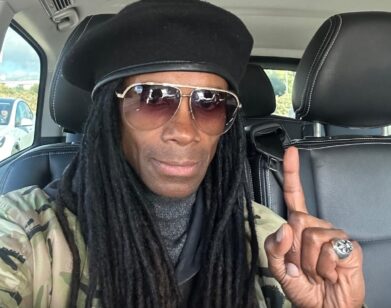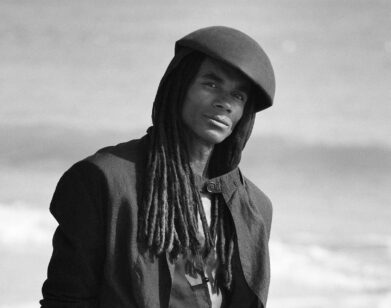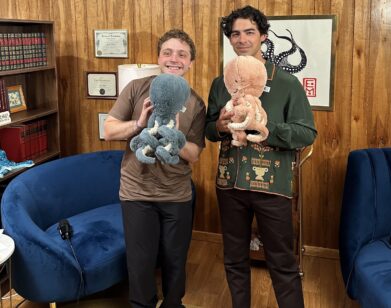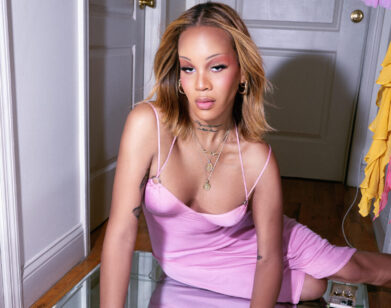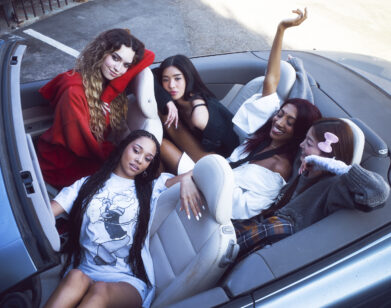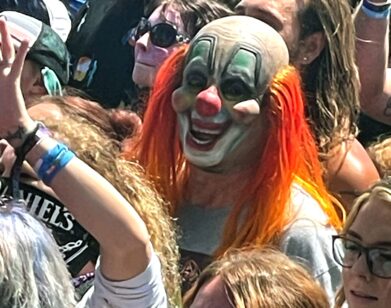Eagulls Get Loud
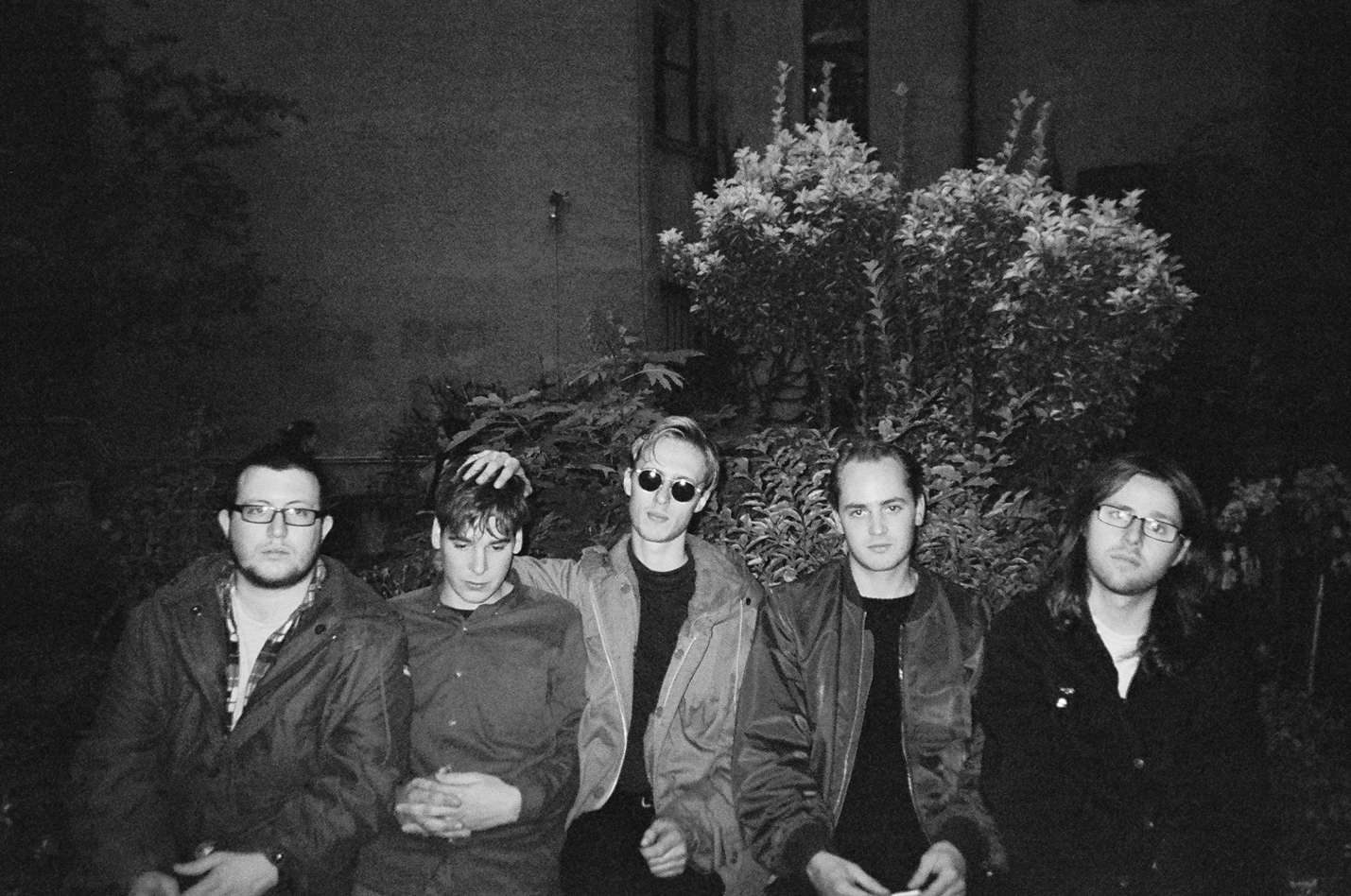
ABOVE: EAGULLS. PHOTO COURTESY OF SANDY KIM
Eagulls are getting impatient. The Leeds, England five-piece has been sitting on its self-titled debut full-length, a blistering surge of compulsively listenable post-punk that recalls the band’s countrymen Gang of Four and the Mekons, for the better part of a year now—and it’s still not coming out until next March (though “Tough Luck,” along with “Opaque,” is being released as a limited-edition 7″ December 16). “We understand that to release it properly we have to do this and that,” says vocalist George Mitchell, “but we’re fucking fed up.”
Mitchell, who grew up with drummer Henry Ruddell and through him met the other band members—guitarists Mark “Goldy” Goldsworthy and Liam Matthews and bassist Tom Kelly—doesn’t mince words. Earlier this year he posted a vitriolic letter on Eagulls’ website directed at “all beach bands”: one of the printable quotes reads, “Without your ’90s hairstyles over your ugly faces you have nothing.” This wariness towards his peers, not to mention the music industry in general, almost stopped him from going on a grant-funded trip to SXSW; there, the band’s nerve-rending noise piqued the interest of Partisan Records’ Tim Putnam (“one of the most down-to-earth people,” says Mitchell), who made an offer and signed the band.
The band members may still be living in the dodgy part of town immortalized in the first song they ever released as Eagulls, 2011’s “Council Flat Blues,” and Mitchell still can’t believe musicians like him can ever truly achieve success, but at least with the label’s resources the band has access to a proper studio and a team that supports them no matter what. “It was quite a struggle at first,” Mitchell says. “But we got there in the end.”

HARLEY BROWN: How did you guys all meet, and what made you decide to leave your old bands to form Eagulls?
GEORGE MITCHELL: Me and Henry, the drummer, we’ve known each other since we was like five or six. He went to Leeds University, and that’s when he met Liam. Liam at the time was in a band, and they split up. Goldie, the other guitarist, had a band that used to play with Liam’s band, and then their band stopped gigging. They were bored because it was holidays from university, so they started writing and jamming together. They were stuck for a singer, and Henry was like, “What about George?”—I used to be in a little punk band that lasted one gig—and they said, “Let’s try him out.” And that was it.
BROWN: What singers do you try to sound like? I interviewed someone who said when you start out singing you try to emulate certain singers—
MITCHELL: I have never, ever tried to emulate anyone when I’m singing. I can’t picture myself trying to. It’s weird, I’ve talked to some other singers about it and they’ve sort of say like, “When I first started, it was blah blah blah.” I’m inspired by other artists lyrically and musically, but singing-wise, no.
BROWN: Which ones, lyrically?
MITCHELL: Matt Johnson from The The. His lyrics have always stuck with me because they’re personal. I don’t know—David Bowie, Bryan Ferry… I never really looked to punk, sort of, lyric people. I’ve never really seen them as inspirational.
BROWN: About writing personal lyrics—”Nerve Endings” is about anxiety, which you struggle with. As you’ve gotten more attention and more press, has your anxiety gotten more or less manageable?
MITCHELL: It comes and goes. Before [this interview], I was nervous but not uncontrollably anxious. That song was more about how I didn’t know I was anxious. I didn’t understand it. I remember talking to someone and they said, “Maybe you’ve got anxiety.” And I was like, “What the fuck is that?” And then it made a bit of sense.
BROWN: What’s the thing you’ve gotten the most anxious about? Like a concert, or an interview…
MITCHELL: I’ve never gotten nervous for a gig. I don’t know the most anxious I’ve ever been… One time I was paralyzed for two days straight. I’ve got this weird blood deficiency called hypokalemic periodic paralysis. I woke up and I couldn’t move for about two days. When it happened I was still in the children’s ward, but I was the biggest one there, so my legs were hanging out of the bed. There was this one professor, luckily, who found out what the deficiency was: potassium in the blood. Otherwise, they wouldn’t have, and I would have deteriorated more and more. At one point they turned to my mum and said, “He might not be able to walk again.”
BROWN: Sounds like good material for a song.
MITCHELL: I did write a song about it called “Cripple.” It was on the first EP, but I don’t like how we recorded it. It’s too slow. It was a lot better when it was live because it’s quicker and a bit more realistic when it’s faster.
BROWN: You’ve said that your live shows are where your truest sound comes out, so how do you make sure to get that sound onto your records?
MITCHELL: It was quite hard to do, but we managed it. When we started, we didn’t go into a proper studio. We recorded at our friend’s demo studios. Most of the first records were really rough, but that was when we were trying to figure out how to play loud and keep the energy in the recordings. The more we did it, the more used to it we got. We worked out things with room mics. When we went to a sophisticated studio for the album, we were able to capture that live, real effect while at the same time being able to layer it up.
BROWN: You guys recorded it a long time ago. Have you been getting impatient sitting on it until March when it comes out?
MITCHELL: Oh, yeah. We recorded it, and we finished it, and we were like, “Thank fuck for that, let’s go to the pub and have some drinks.” Then it was like, the next day, we need to do the artwork. And then it’s like, for fuck’s sake, we have to master it. We sent it off and thought, “This is going to be a couple of days’ work. They’ll get it done, bring it back, Bob’s your uncle, you’ve got an album.” But there was a major issue with the cymbal. The way it was recorded, it was making this horrible fizz sound. To cut a long story short, we threw the cymbal in the fucking river.
BROWN: In January of last year, you posted that letter on your website about how bands pander to each other, and to music journalists, but that was before you went to CMJ and SXSW. Now it seems like you became one of those bands…
MITCHELL: That’s probably what it seems like, but before we went to SXSW, I said, “I don’t want to go.” And everyone was like, “For fuck’s sake, man, we’re going to America for free, and we’ve already got an album written and recorded.” So we went out there and luckily—well, it’s not luck the way I saw it. It was natural, how we met Tim from Partisan. It’s not like we walked into a bar and played for Simon Cowell.
It’s all about industry politics. Obviously we have to deal with that now because we have to put records out, but we didn’t go around sending our shit to every single fucking person in the world. Performing for them, wearing some clothes we don’t want to wear just to please people so they put this record out. We didn’t do none of that shit like a lot of bands do. We didn’t want to do none of that shit, but you wind up doing that, and we wound up being one of the bands that people actually like. We’re real, and we’re not bullshit, and we don’t fake our acts. We’re a true band.
BROWN: A lot of your music addresses problems that are facing millennials, like how you graduate college with high hopes and then because the economy sucks you work retail jobs. Are your songs intentionally political?
MITCHELL: I don’t think any of the lyrics I’ve written are political—well, you could say that, but then everything’s political, isn’t it? You’re walking down the street, it’s political. You trip on the pavement because there’s a hole in the floor because someone hasn’t paid to fill the pothole. It’s just bad luck that we’re in this generation where you’re educated and you wake up, eat your breakfast, go to school, go to university… Everyone’s allowed to go to university now. I was the first person in my family to go. They’re letting too many people into university, that’s what I think sometimes. And then afterwards, there’s too many people to choose from.
BROWN: It seems like your full-length has a darker edge than your earlier releases.
MITCHELL: I think so. When we first started, it was experimenting and stuff like that. As we’ve gotten older, we’ve gotten more bitter, and more agitated with what we’re doing. When you’re doing the same thing over and over again you do get pissed off. Working shitty retail jobs, moving house every year because we’re on student contracts, shit like that. That’s why the music has gotten a bit darker.
BROWN: Are you guys aiming to make music full-time?
MITCHELL: If we can do it full-time, that’s better, isn’t it? I just can’t imagine people can do that without someone behind them telling them what to do. And that’s something we’ll never do. Even the successful bands, a Pitchfork band or something—there’s nothing wrong with that—people look at them and think they’re rock stars, but they all go home with nothing. They don’t have any money because they spend it on touring and driving around, paying for petrol… If you’re going to do music nowadays, you have to do it because you want it. Not for the fame or the money, because there is none.
EAGULLS’ SELF-TITLED DEBUT FULL-LENGTH ARRIVES MARCH 4, 2014 VIA PARTISAN RECORDS. THE LIMITED-EDITION “TOUGH LUCK” 7″ IS OUT DECEMBER 16. FOR MORE INFORMATION ON THE BAND, VISIT THEIR WEBSITE.

